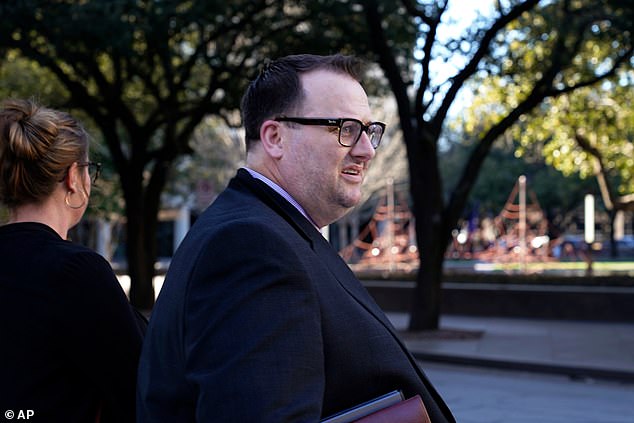More than six years after Los Angeles Angels pitcher Tyler Skaggs was found dead in a Texas hotel room, the heartbreaking story of his final days is back in court.
His family believes the Major League Baseball team bears responsibility for his death, claiming the organization turned a blind eye to serious drug problems within its own staff.
At the heart of this civil trial is a $118 million wrongful death lawsuit, filed by Skaggs’ wife and parents.
They argue that the Angels failed to protect the young athlete from a dangerous environment that allowed drug use to spiral out of control behind the scenes.
The Team Employee at the Center of It All
According to the family’s attorney, the tragedy could have been prevented if the Angels had enforced their own drug policies.
The lawsuit claims that Eric Kay, the team’s former communications director, supplied Skaggs with a fentanyl-laced pill that caused his fatal overdose during a team trip to Texas in 2019.
Kay was later convicted in 2022 of distributing the drugs that killed Skaggs and is now serving 22 years in federal prison.
But the family’s legal team says the Angels should also be held accountable for keeping Kay on the job despite knowing he was battling addiction and allegedly dealing drugs to players.
“They Buried Their Heads in the Sand”
During opening statements, attorney Shawn Holley told jurors that Angels officials were aware Kay was struggling with opioid abuse and had shown up to work under the influence.
She alleged that Kay was providing opioids to at least six different players, including Skaggs, yet the organization failed to act.
Holley accused the team of enforcing drug rules selectively—strictly applying them to stadium workers while ignoring clear warning signs among higher-level staff.
“They buried their heads in the sand over and over again, and as a result, Tyler Skaggs is dead,” Holley said in court.
The family is seeking $118 million for Skaggs’ lost earnings and emotional damages, as well as punitive penalties against the team.
The Angels’ Defense: “He Made His Own Choices”
The Angels’ attorney, Todd Theodora, painted a very different picture.
He told jurors that Skaggs’ death was the result of his own reckless choices, not negligence by the team.
Theodora said autopsy results showed that Skaggs had mixed alcohol with oxycodone and fentanyl, leading to his death.
“He died due to his reckless decision to mix large amounts of alcohol with narcotics on the night he died,” he argued.
Theodora emphasized that the Angels were unaware of Skaggs’ drug use and had no reason to believe Kay was distributing narcotics to any player.
“The evidence will show that Angels Baseball did not know that Tyler had a drug problem or that Eric Kay was distributing drugs to any player. Period. End of story,” he said.
A Painful Day in Court
Inside the Santa Ana courtroom, Skaggs’ wife and mother sat quietly as both sides laid out their arguments.
Team owner Arte Moreno, president John Carpino, and several lawyers were also present, along with reporters covering the long-awaited trial.
The tragic events unfolded back in July 2019, when Skaggs, then just 27, was found unresponsive in his hotel room near Dallas. The Angels were in town for a four-game series against the Texas Rangers.
The coroner’s report revealed that Skaggs had choked on his own vomit after ingesting a deadly mix of alcohol, oxycodone, and fentanyl.
A Culture of Access and Addiction
Prosecutors say the problem wasn’t isolated. During Kay’s criminal trial, five MLB players testified that he had supplied them with oxycodone between 2017 and 2019.
Holley told jurors that players were allegedly buying drugs from Kay in the locker room, parking lot, and even inside the clubhouse to help them manage pain and stay on the field.
Kay himself had gone through rehab earlier in 2019 after his wife found text messages showing he was providing pills to players.
Holley argued that the team ignored these warnings and allowed him back to work soon after his treatment.
“It was rampant, out of control, and incredibly dangerous,” Holley said of the drug culture surrounding the team.
MLB’s Response and Policy Changes
In the aftermath of Skaggs’ death, Major League Baseball reached an agreement with the players’ association to begin opioid testing for all players.
Those who test positive are now referred to treatment programs rather than punished, marking a major shift in how the league handles addiction.
Skaggs, who had been part of the Angels’ starting rotation since 2016, had battled injuries throughout his career.
Before joining the Angels, he played for the Arizona Diamondbacks.
Ex-Teammates Draw New Scrutiny
The case has also reignited questions about some of Skaggs’ former teammates, including Wade Miley, who now pitches for the Cincinnati Reds.
In a deposition, Skaggs’ former agent Ryan Hamill claimed that Skaggs had once admitted to getting drugs from Miley after his parents confronted him about his erratic behavior.
Miley, 38, has not been charged with any crime and has denied involvement.
However, his name surfaced during Kay’s sentencing when prosecutors played a recorded conversation in which Kay claimed Miley was one of Skaggs’ drug sources.
What Happens Next
The wrongful death trial is expected to last several weeks and could see testimony from major figures in baseball, including Angels outfielder Mike Trout.
For Skaggs’ family, this case represents one final fight for justice — and a plea for accountability from a sport still haunted by a young life lost far too soon.
Share on Facebook «||» Share on Twitter «||» Share on Reddit «||» Share on LinkedIn
